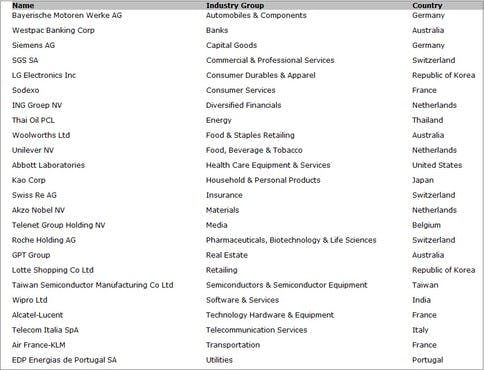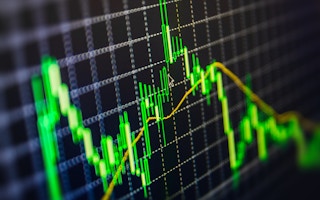Asia Pacific-based companies topped sustainability leadership rankings for nine out of 24 major industry groups that make up the global economy, according to results from the annual Dow Jones Sustainability Indices (DJSI) review released on Thursday.
This was a slight improvement from 2013, where eight regional companies were recognised by DJSI as industry group leaders.
Japanese household products manufacturer Kao Corporation, energy provider Thai Oil, Indian software firm Wipro Limited and Australian bank Westpac were among the DSJI’s selection of the most sustainable company for 24 broad categories that constitute the global economy, including industries such as banking, food and beverage, real estate, and pharmaceuticals.
These industry leaders represent the top performers of the DSJI 2014, which is a collaborative effort between financial information firm Dow Jones and sustainability investing specialists RobecoSAM.
Now in its fifteenth year, the DSJI is an annual exercise where more than 3,000 companies fill out an extensive Corporate Sustainability Assessment by RobecoSAM, which evaluates their tax strategies, social and environmental reporting practices, and human capital development, among others.
Top-scoring companies are then listed on one or more of the indices that make up the DJSI family of indices, the most notable of which is the DJSI World Index. This index lists the top 10 per cent of the world’s 2,500 largest companies.
Notably, the 10 largest companies to be deleted from the DJSI World Index included sports goods manufacturer Nike, coffee giant Starbucks and fast food chain McDonald’s. Their scores did not rank among the top 10 per cent of their industry groups this year.
In their place, the 10 largest additions to the list included the Commonwealth Bank of Australia, pharmaceutical firm GlaxoSmithKline, and German courier company Deutsche Post.
Other categories of indices were also published, including region-specific listings for Asia Pacific, Europe, and North America, and a special index for emerging markets. These listings are not publicly available, however, and a licence is required for access.
Based on the premise that sustainable business practices lead to long-term value creation for shareholders, the indices are meant to help potential investors identify companies with strong sustainability practices and financial prospects.
Since the initiative’s launch in 1999, the DSJI has come to be widely recognised as the leading sustainability leadership benchmark.
RobecoSAM’s head of indices Guido Giese said that the DJSI “helped investors realise the financial materiality of sustainability”, referring to the impact of sustainability on a company’s financial performance. He also shared that companies found it to be “an excellent tool to measure the effectiveness of their sustainability strategies”.
Only 319 companies – representing the top 10 per cent of scores in each industry grouping – qualified for the DSJI World Index, which in turn was the selection pool for the 24 industry group leaders.

List of DJSI 2014 Industry Group Leaders 2014. Image: Dow Jones Sustainability Indices
Australian bank Westpac clinched this top honour for the banking industry group, achieving its highest ever score of 93 per cent on the RobecoSAM assessment.
“
Heading the ranking means we are effectively using the DJSI to continuously improve our sustainability performance so that we are better equipped to provide solutions for the increasing needs of the planet’s growing population.
Ton Buchner, chief executive, AkzoNobel
Gail Kelly, chief executive of Westpac, said that this leadership position clearly showed that the bank’s “commitment to sustainability is deeply embedded in our business processes, culture and operational strategy”.
According to the assessment, Westpac demonstrated a strong performance in various business aspects, including climate strategy, labour practices and human rights, and supply chain management.
Dutch paints and coatings company AkzoNobel beat 350 other companies in the materials industry to retain its top spot in the index for the third consecutive year.
Ton Buchner, chief executive of AkzoNobel, said that “heading the ranking means we are effectively using the DJSI to continuously improve our sustainability performance so that we are better equipped to provide solutions for the increasing needs of the planet’s growing population”.
Singapore real-estate company CapitaLand also celebrated a third consecutive year on the DJSI World index, which it dubbed the “gold standard for corporate sustainability”. The company also made the cut for the DJSI Asia Pacific Index for the fifth time since 2009, when it was the first Singaporean real estate company to be featured in the Asia-Pacific edition of the index.
Tan Seng Chai, group chief corporate officer of CapitaLand and chairman of its sustainability steering committee, said that “sustainability is integral to CapitaLand – it is important that our business is both profitable and sustainable through innovation and stakeholder engagement”.

















